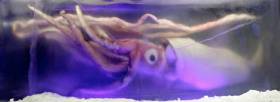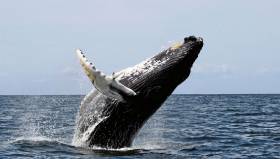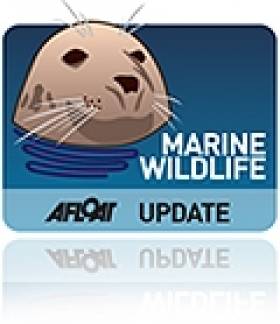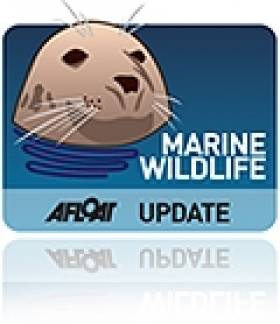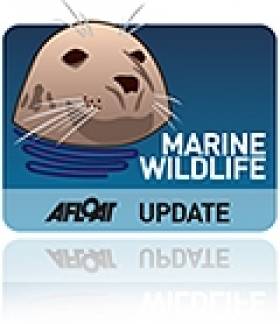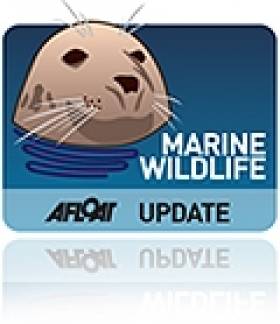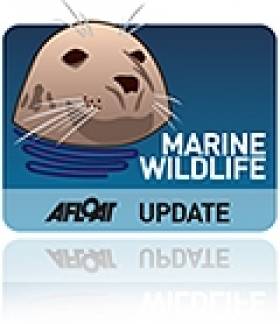Displaying items by tag: orcas
Kerry Trawler Lands Second Giant Squid In As Many Months
#MarineWildlife - Once was exciting enough — but a Kerry trawler had landed a second giant squid in as many months, as RTÉ News reports.
Local fisherman Pete Flannery landed what was the first giant squid recorded in Irish waters for 22 years in mid May, as previously reported on Afloat.ie.
But amazingly, he had repeated the feat this month while trawling in the same area, on the Porcupine Bank west of Dingle.
Before this year, only five of the enormous cephalopods had been found in Irish waters since records began in 1673.
What’s more, two of those squid were landed by Flannery’s own father Michael back in 1995.
“I'll probably have to catch a third now so that I can have bragging rights,” Flannery told RTÉ News, which has more on the story HERE.
Another Giant Squid landed in Dingle. Only 7th recorded in Ireland in 350 years. Amazingly 4 have been caught by Flannery family! @rtenews pic.twitter.com/1gWBYZr045
— Seán Mac an tSíthigh (@Buailtin) July 18, 2017
Elsewhere, a Galway man recorded video of a killer whale carcass washed up on the shore near Roundstone in Connemara.
Independent.ie reports that the orca sighting was confirmed by the Irish Whale and Dolphin Group, whose Mick O’Connell said the species is “neither common nor very rare [but] you wouldn’t see then very often.”
Ireland’s North Coast is a regular haunt for an “evolutionary significant” pod of killer whales that has been under threat for years due to its lack of young.
Whale Watchers Claim First Irish Humpback Sighting Of 2017
#MarineWildlife - Whale watchers off the Sunny South East believed they’ve photographed Ireland’s first humpback whale sighting of 2017, as TheJournal.ie reports.
South Coast Charter Angling skipper Martin Colfer was out with photographer Myles Carroll yesterday (Wednesday 4 January) when they caught a glimpse of the tail fin of the 13-metre-long marine mammal as it slinked back under the surface.
In other Irish whale news, The Times says work has begun on removing the famous diplodocus skeleton replica from London’s Natural History Museum to make way for a blue whale found in Wexford more than a century ago.
As previously reported on Afloat.ie, the whale specimen has been in the museum’s collection since it washed up at Wexford Harbour in 1891, and will now take pride of place in the central that Dippy previously called home since 1905.
Meanwhile, the world’s oldest killer whale is presumed dead after researchers lost track of her movements some months ago, according to the Guardian.
Believed to be 105 years old, ‘Granny’ was the matriarch of a small and endangered group of orcas in Puget Sound, north of Seattle in the north-west United States.
“With regret we now consider her deceased,” researcher Ken Balcomb, who has tracked Granny and her fellow orcas over four decades.
The genetically unique population bares comparison with the distinctive orca pod that splits its time between Ireland and Scotland, and which has faced its own challenges in recent years.
Pollution Threat To Ireland's Killer Whale Regulars
#MarineWildlife - "High pollution levels" could be to blame for the failure of Ireland's only resident killer whale pod to produce any calves.
As reported two years ago on Afloat.ie, the well-known orca pod often seen between Scotland and Ireland has been judged to be on the 'brink of extinction', with its conservation status described as "critical".
Since then the pod's number has dwindled from nine adults to just seven, with no juveniles recorded in the 30 years the so-called Scottish West Coast Community has been monitored by researchers.
One reason for that, posits Dr Simon Berrow of the Irish Whale and Dolphin Group (IWDG), could be "high pollution levels" in the food chain which may have rendered them infertile.
“If you’re moving all around Europe and living a long time, you get a lot of contaminants from fish over time,” he told the Irish Mirror.
That's a theory backed up by evidence of pollutants detected in whale carcasses beached around Ireland in recent years.
Far from the ferocious beasts of horror tales, Ireland's killer whales are considered among the gentle giants in the marine wildlife world - with one recently the recipient of a shark bite on his tail fluke.
Marine scientists have long been interested in the group for their genetic distinctness from other orcas in the north Atlantic, bearing closer relation to their Antarctic cousins.
#MarineWildlife - Six weeks after the first sighting of basking sharks this year off West Cork comes news that a pair of killer whales have been seen near Baltimore.
The Southern Star reports on the rare sight for the area of these cetaceans with a fearsome reputation, but who have never been known to kill a human in the wild.
It's believed that the orca duo may be part of a bigger pod that was feeding off West Cork at the time.
And they seem to be happy finding their own food, unlike their counterparts in the Southern Ocean who have taken to nabbing fishermen's catches.
According to the Guardian, killer whales off the Crozet Islands between Africa and Antarctica have learned to grab Patagonian tooth fish off longlines since a fishery was established there some 20 years ago.
Now scientists say they've found a link between this near constant supply of food and the orcas' reproductive rates. In other words, more fish means more, and healthier, killer whale calves.
#MarineWildlife - BBC News reports that three killer whales from a community of orcas off the Scottish west coast have been spotted off the country's east coast for the first time since scientists began monitoring the group in the 1990s.
Mark Hosford of the Hebridean Whale and Dolphin Trust described the sighting as "a really exciting development".
He added: "The west coast community is thought to be the only resident population of orca in the British Isles, and understanding their behaviour and movements is crucial to the conservation of these remarkable creatures."
The group's normal range includes Scotland's north and west coasts to the west coast of Ireland, and is thought to comprise just nine older whales - which are also believed to be genetically distinct from other orcas in the North Atlantic, showing much closer similarity to Antarctic killer whales.
As reported on Afloat.ie earlier this year, marine wildlife experts fear that the group is now on the "brink of extinction".
Killer Whales Surprise Angling Brothers Off Donegal
#MarineWildlife - Following the good news of the beached whale rescue in Co Meath today, the Irish Independent reports on a surprise killer whale sighting in Donegal.
Sea angling brothers John and Pat Cunningham described the "beautiful sight" of two orcas who emerged from the water by their rowing boat half a mile from the coast off Glencolmcille.
"I've only ever seen them in the North Sea when I was commercial fishing up there", said John of the unexpected rendezvous.
The Irish Whale and Dolphin Group's record of the sighting speculates that the killer whales may be the same pair spotted off Mizen Head in Cork on 11 June and Slea Head in Kerry a day later.
Killer whales are a rare sight so close to the shore but they are no strangers to Donegal - as last year's appearance of a well known orca pod in Lough Swilly demonstrates.
However, fears were expressed earlier this year that that particular family, often seen off the coasts of Scotland and Ireland, is on the 'brink of extinction'.
More Whales Spotted in Irish Waters
Killer whales and a humpback whale have been spotted off the coast of Northern Ireland in recent weeks, according to the Irish Whale and Dolphin Group (IWDG).
Irish Weather Online quotes the IWDG's Pádraig Whooley, who said three killer whales - or orcas - had been seen off Rathlin Island in Co Antrim on 10 June. Two more were later spotted between the Down coast and the Isle of Man.
Then on 14 June a humpback whale was sighted off Bangor - only the third time the species has been seen in Northern Irish waters.
"Any sighting today of a humpback whale sends out a very strong conservation message," said Whooley.


























